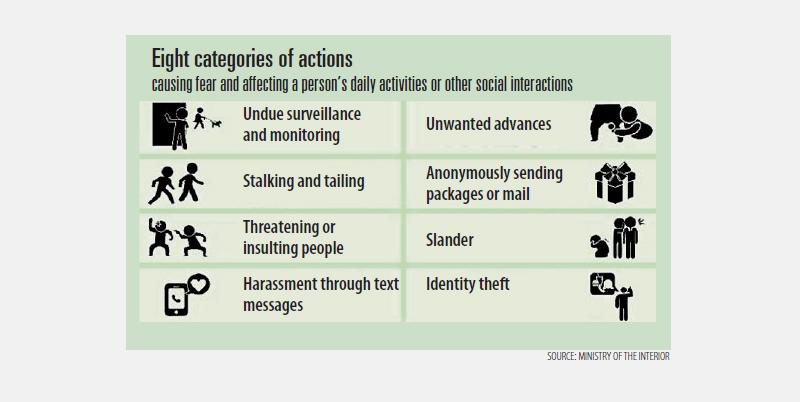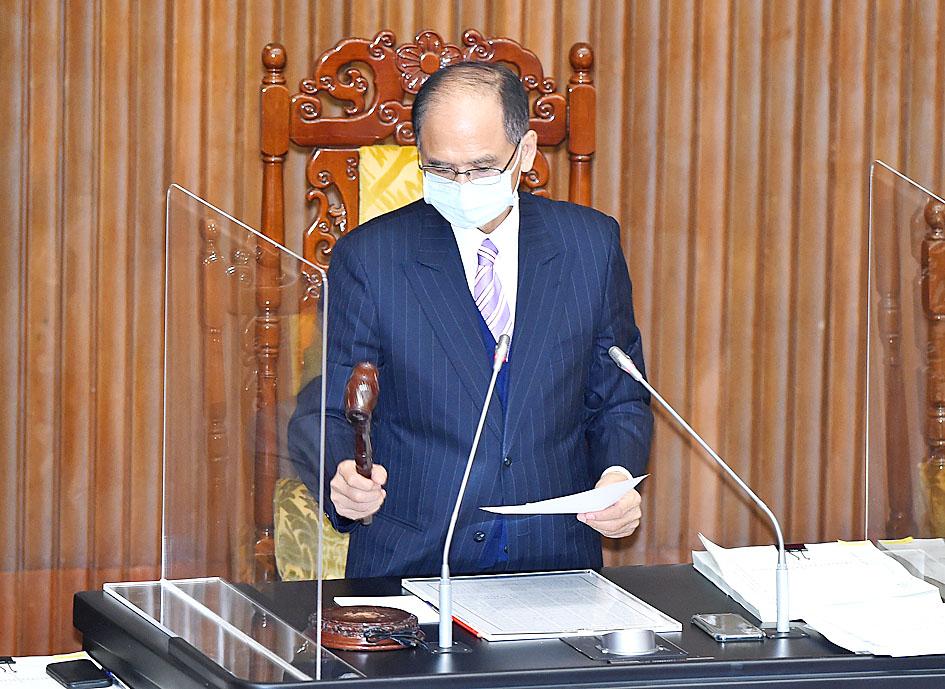The Legislative Yuan yesterday passed the Stalking and Harassment Prevention Act (跟蹤騷擾防制法), which makes stalking a crime that is punishable by up to five years in prison.
The bill focuses on eight major kinds of stalking and harassment behaviors that repeatedly target a victim against their will: surveillance and monitoring, stalking and tailing, threatening and insulting, harassment through electronic communications, unwanted advances, anonymously sending mail, slander, and identity theft.
After the police receive reports of such behavior, they can initiate an investigation, arrest suspects and advise a court to detain them, the Ministry of the Interior said in a news release.

Police can issue written warnings and if they find that a suspect has committed the crime again, they can ask a court to issue a protective order for the victim, it said.
The court can detain suspects as a preventive measure if they are found in possession of weapons or dangerous items, or are considered likely to commit the same crime again, it said.
Offenders would face a jail term of less than one year or a fine of NT$100,000. If they are found in possession of a weapon or other dangerous items, their penalty can be increased to five years in jail or a fine of up to NT$500,000, it said.

Photo: Liao Chen-huei, Taipei Times
Those who contravene a court-issued protective order for a victim would face a prison term of up to three years or a fine of NT$300,000, it added.
The law is to be implemented six months after it is promulgated, the ministry said.
Minister of the Interior Hsu Kuo-yung (徐國勇) in the statement thanked lawmakers, as well as civic groups, for their efforts in pushing for the bill’s passage over the past six years.
The bill makes stalking and harassment crimes, as in many other countries, the ministry said.
To hasten the implementation of the act, the ministry would soon complete training for police officers nationwide, as well as set up regulations related to the bill, it said.
The ministry would also present assessment reports on the act’s efficiency three years after it is implemented to keep improving social safety, it said.

CHAOS: Iranians took to the streets playing celebratory music after reports of Khamenei’s death on Saturday, while mourners also gathered in Tehran yesterday Iranian Supreme Leader Ayatollah Ali Khamenei was killed in a major attack on Iran launched by Israel and the US, throwing the future of the Islamic republic into doubt and raising the risk of regional instability. Iranian state television and the state-run IRNA news agency announced the 86-year-old’s death early yesterday. US President Donald Trump said it gave Iranians their “greatest chance” to “take back” their country. The announcements came after a joint US and Israeli aerial bombardment that targeted Iranian military and governmental sites. Trump said the “heavy and pinpoint bombing” would continue through the week or as long

TRUST: The KMT said it respected the US’ timing and considerations, and hoped it would continue to honor its commitments to helping Taiwan bolster its defenses and deterrence US President Donald Trump is delaying a multibillion-dollar arms sale to Taiwan to ensure his visit to Beijing is successful, a New York Times report said. The weapons sales package has stalled in the US Department of State, the report said, citing US officials it did not identify. The White House has told agencies not to push forward ahead of Trump’s meeting with Chinese President Xi Jinping (習近平), it said. The two last month held a phone call to discuss trade and geopolitical flashpoints ahead of the summit. Xi raised the Taiwan issue and urged the US to handle arms sales to

State-run CPC Corp, Taiwan (CPC, 台灣中油) yesterday said that it had confirmed on Saturday night with its liquefied natural gas (LNG) and crude oil suppliers that shipments are proceeding as scheduled and that domestic supplies remain unaffected. The CPC yesterday announced the gasoline and diesel prices will rise by NT$0.2 and NT$0.4 per liter, respectively, starting Monday, citing Middle East tensions and blizzards in the eastern United States. CPC also iterated it has been reducing the proportion of crude oil imports from the Middle East and diversifying its supply sources in the past few years in response to geopolitical risks, expanding

Pro-democracy media tycoon Jimmy Lai’s (黎智英) fraud conviction and prison sentence were yesterday overturned by a Hong Kong court, in a surprise legal decision that comes soon after Lai was jailed for 20 years on a separate national security charge. Judges Jeremy Poon (潘兆初), Anthea Pang (彭寶琴) and Derek Pang (彭偉昌) said in the judgement that they allowed the appeal from Lai, and another defendant in the case, to proceed, as a lower court judge had “erred.” “The Court of Appeal gave them leave to appeal against their conviction, allowed their appeals, quashed the convictions and set aside the sentences,” the judges